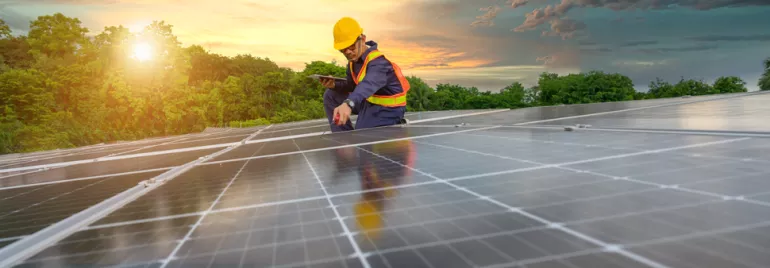Are you looking to hire?
Find the right candidate today.
We're aware of a global phishing scam impersonating employees via email, WhatsApp, and Telegram, but no PageGroup systems have been breached. Find out how to protect yourself

The green revolution is upon us, and for manufacturing, it's a time of both immense opportunity and a looming challenge: the green skills shortage. The numbers don't lie. Reports suggest a staggering gap of 200,000 green-skilled workers in the UK alone, jeopardising net-zero targets. But this shouldn't be a cause for despair. It's a call to action.
Green skills are the know-how to build a sustainable world. They're about using resources wisely, protecting the planet, and creating a greener future. Green skills in engineering and manufacturing focus on creating products and processes that are sustainable and environmentally friendly. For example:
Think beyond traditional recruitment channels. As Effi-Svende Ball, Customer Value Chain Director at Okarno, shares, "Working in the manufacturing environment [...] is a dynamic environment that fuels progress and fosters a culture of continuous improvement."
Engineers from other fields can bring invaluable expertise and fresh perspectives. Their existing skills, combined with targeted upskilling programmes, can bridge the green skills gap. Imagine an aerospace engineer transitioning to work on sustainable aviation fuels!
Let's not forget the untapped potential of women in STEM careers. Studies reveal a significant underrepresentation of women in engineering and manufacturing.
While over one million women now work in STEM occupations, they still account for only 29% of the workforce. This underrepresentation is a missed opportunity for innovation and problem-solving.
Whilst we’re seeing a gradual increase, at the current rate of change, studies show we would not see equal representation in STEM until the year 2070. The urgency of addressing this issue is undeniable.
With 43% of STEM vacancies proving difficult to fill, businesses cannot afford to overlook half of the potential talent pool. Additionally, a staggering 75,000 STEM returners – those who have taken lengthy career breaks to care for others – are eager to re-enter the workforce, bringing valuable experience and skills.
By actively encouraging more women to join the industry, we unlock a diverse and highly capable talent pool. A diverse workforce brings together a wider range of perspectives, experiences, and problem-solving approaches.
This fosters a more creative and innovative environment, leading to the development of groundbreaking solutions. A culture of inclusion fosters collaboration and open communication, leading to better decision-making and improved outcomes.
A diverse workforce, reflective of the communities in which a business operates, offers a distinct advantage in understanding and addressing the unique green skill needs of those communities. By employing individuals with diverse backgrounds and experiences, businesses can gain insights into the specific environmental challenges and opportunities faced by different populations. This knowledge is invaluable in developing tailored green solutions, products, and services that resonate with and benefit the community.
By implementing these strategies, you'll not only work towards addressing the green skills shortage but also build a more diverse, innovative, and future-proof manufacturing workforce. Let's tackle this challenge together and shape a greener future for all.
Michael Page can help. Our expert recruiters specialise in matching top talent with forward-thinking organisations like yours. Contact us today to discuss your hiring needs.